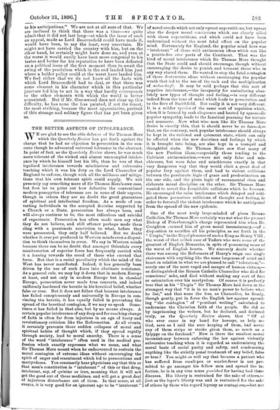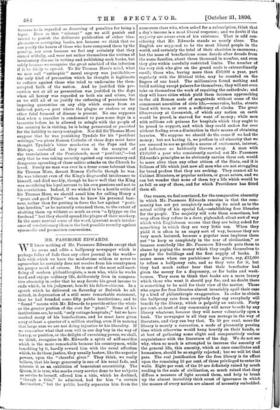THE BETTER ASPECTS OF INTOLERANCE.
WE are glad to see the able deferce of Sir Thomas More which the Quarterly Review has put forth against the charge that he had no objection to persecution in the con- crete though he advocated universal tolerance in the abstract. In point of fact, as the Quarterly Review shows, he was much more tolerant of the wicked and almost unexampled intoler- ance by which he himself lost his life, than he was of that legalised intolerance towards mischievous and subversive teaching which it was his duty as the Lord Chancellor of England to enforce, though with all the mildness and mitiga- tions that his own tolerant spirit could supply. We will presently say something more of Sir Thomas More's own case, but first let us point out how defective the conventional modern panegyrics of tolerance are in some of their aspects, though in others they are no doubt the great guarantees of spiritual and intellectual freedom. As a mode of con- verting individuals to the accepted doctrine supported by a Church or a State, persecution has always been, and will always continue to be, the most ridiculous and suicidal of expedients. Persecution has often made men say what they do not believe, and still oftener perhaps made them cling with a passionate conviction to what, before they were persecuted, they only half believed. But we doubt whether it ever yet produced in Western minds even a disposi- tion to think themselves in error. We say in Western minds because there can be no doubt that amongst Orientals every manifestation of superior force has frequently carried with it a leaning towards the creed of those who exerted that force. But that is a racial peculiarity which the mind of the West has never manifested. Indeed, it has generally been driven by the use of such force into obstinate resistance. As a general rule, we may lay it down that in modern Europe at least, and not only in modern Europe but in classical Europe, persecution never made true converts, and indeed uniformly hardened the heretic in his heretical belief, whether false or true. But it does not follow that because intolerance has failed conspicuously and universally in Europe in con- vincing the heretic, it has equally failed in preventing the spread of the heretical contagion, if we may so speak Some- times it has failed in that also, but by no means always. A certain popular intolerance of any deep and far-reaching change of faith is often far from injurious in an age of hasty and revolutionary criticism like the Reformation, At all events, it certainly prevents those sudden collapses of moral and spiritual habits of thought which, if they spread rapidly through society, lead to moral anarchy. There is a sense of the word " intolerance " often used in the medical pro- fession which exactly expresses what we mean, and what Sir Thomas More meant when he endeavoured to restrain the moral contagion of extreme ideas without encouraging the spirit of anger and resentment which led to persecutions and martyrdoms. You constantly hear physicians say that this or that man's constitution is " intolerant " of this or that drug, intolerant, say, of quinine or iron, meaning that it will not get the good out of these medicines, and will get a great deal of injurious disturbance out of them. In that sense, at all events, it is very good for an ignorant age to be " intolerant " of novel creeds which not only uproot superstitions, but uproot also the deeper moral convictions which are closely allied with those superstitions, and which could not have been undermined without the most fatal effect on the popular mind. Fortunately for England, the popular mind here was " intolerant " of those wild antinomian ideas which ran like a prairie-fire over parts of the Continent. That was the kind of moral intolerance which Sir Thomas More thought that the State could and should encourage, though without encouraging the desire to punish and torment those who in any way shared them. He wanted to stop the fatal contagion of these destructive ideas without encouraging the popular wrath that led to the use of the rack and the multiplication of autos-dale. It may be said perhaps that this sort of negative intolerance,—the incapacity for assimilating abso- lutely new types of thought and feeling,—is very different indeed from the tone of mind which leads to persecution and to the fires of Smithfield. But really it is not very different. It is a milder species of the same sort of repulsion which, when it is fanned by rash eloquence and heated by spasmodic popular sympathy, leads to the fanatical yearning for torture and massacre. Now what wise men like Sir Thomas More desire is exactly this, that it should never be so fanned,— that, on the contrary, such popular intolerance should always be kept in the rational and quiescent state, which can only be effected when the new doctrines and feelings by which it is brought into being, are also kept in a tranquil and thoughtful state. Sir Thomas More saw that many of the new Puritan ideas,—especially those tending to the Calvinist antinomianism,—were not only false and mis- chievous, but were false and mischievous exactly in that very dangerous way that they would elicit a great deal of popular fury against them, and lead to violent collisions between the passionate logic of grace and predestination on the one side, and the pions logic of sacramental rites and elaborate moral discipline on the other. Sir Thomas More wanted to arrest the formidable collisions which he foresaw. He encouraged the calm intolerance which delayed and miti- gated these premature collisions of thought and feeling, in order to forestall the violent intolerance which he anticipated from the spread of the new epidemic.
One of the most truly large-minded of pious Roman Catholics, Sir Thomas More certainly was not what the present Bishop of Peterborough's charge represented him when Dr. Creighton eccused him of gross moral inoonsistency,—of disposition to sacrifice all his principles, as set forth in the "Utopia," to the Royal pleasure of such a King as Henry the worst of that selfish race of Tudors who were some of the greatest of English Monarchs, in spite of possessing some of the worst of English hearts. We sincerely doubt whether there was among the Reformers of Henry's reign one single statesman with anything like the same largeness of mind and heart in relation to what we are pleased to call " toleration,"— surely one of the most vapid and meagre of human virtues,— as distinguished the Roman Catholic Chancellor who died for conscience' sake, and died without making any sort of fuss or ostentation over his martyrdom. Of course it is perfectly true that in his " Utopia " Sir Thomas More laid down in the strongest way that "it is in no man's power to believe what he list," and that none the less, as Chancellor, he firmly, though gently, put in force the English law against spread- ing "the contagion" of "pestilent writing" calculated to undermine the Christian faith of the people. He did so by imprisoning the writers, but he declared, and declared truly, as the Quarterly Review shows, that " Of al who ever came in my hand for heresye, as help me God, save as I said the sure keeping of them, bad never any of them stripe or stroke given them, so much as a fylyppe on the forehead." Now is there the smallest moral inconsistency between enforcing the law against violently subversive teaching when it is regarded as undermining the moral basis of social purity and safety, and condemning anything like the strictly penal treatment of any belief, false or true P You might as well say that because a patient who has suffered from small-pox or scarlet-fever is not per- mitted to go amongst his fellow men and spread the in- fection, he is in any true sense punished for having had these diseases. His liberty is restrained for the sake of others,— just as the leper's liberty was and is restrained for the sake of others by those who regard leprosy as contagions,—but not because he is regarded as deserving of penalties for being a leper. Even in this " tolerant " age we still punish and intend to punish the deliberate publication of either blas- phemous or corrupting books, not because we think that we can purify the hearts of those who have composed them by the penalty, nor even because we feel any certainty that they sinned wilfully, and were not rather themselves the victims of involuntary disease in writing and publishing such books, but solely because we recognise the great mischief of the infection if it be likely to spread. To Sir Thomas More's mind, what we now call " antiseptic " moral surgery was justifiable,— the only kind of precaution which he thought it legitimate to enforce against those who tried to undermine the then- accepted faith of the nation. And he justified this pre- caution not at all as persecution was justified in the days when all heresy was regarded as both sin and crime, but as we still all of us justify the enforcing of provisions for imposing quarantine on any ship which comes from an infected port,—a port where the plague or cholera or any other fatal ferment of disease is present. No one supposes that when a traveller is condemned to pass some days in a lazaretto before he is allowed to mingle with the people of the country he is visiting, he is being persecuted or punished for the liability to carry contagion. Nor did Sir Thomas More suppose that he was punishing Tyndale for his "pestilent writings,"—a pious Roman Catholic of those days must have thought Tyndale's bitter mockeries at the Pope and the Bishops, embodied as they were in the margins of the translations of the Pentateuch, most "pestilent,"—but only that he was taking security against any unnecessary and dangerous spreading of these satiric attacks on the Church he loved. Surely no man was ever in a truer sense tolerant than Sir Thomas More, devout Roman Catholic though he was. He was tolerant even of the King's disgraceful intolerance to himself, and died meekly, though he knew well that the King was sacrificing his loyal servant to his own passions and not to his convictions. Indeed, if we wished to be a hostile critic of Sir Thomas More, we should assail him for calling Henry a "great and good Prince" when he knew his personal base- ness, rather than for putting in force the law against "pesti- lent heretics," as he naturally esteemed them, to the extent of shutting them up without so much as even "a fylyppe on the forehead" lest they should spread the plague of their mockery. In the more neutral sense of the word, ignorant men's intoler- ance of revolutionary ideas is the best possible security against spasmodic and premature conversions.











































 Previous page
Previous page